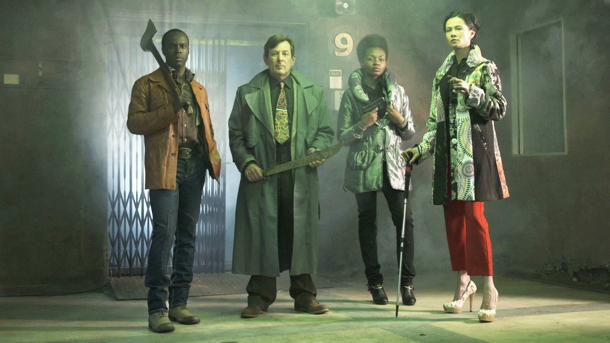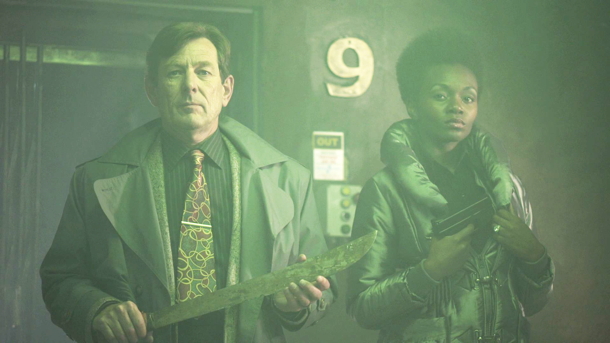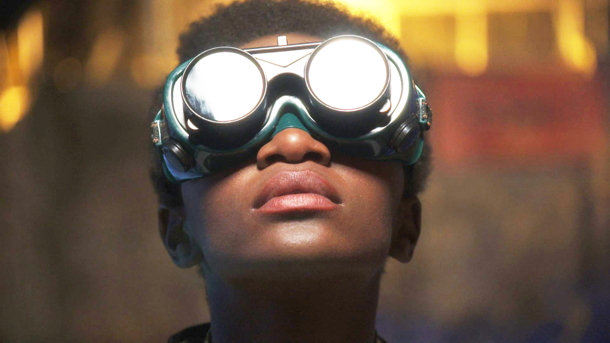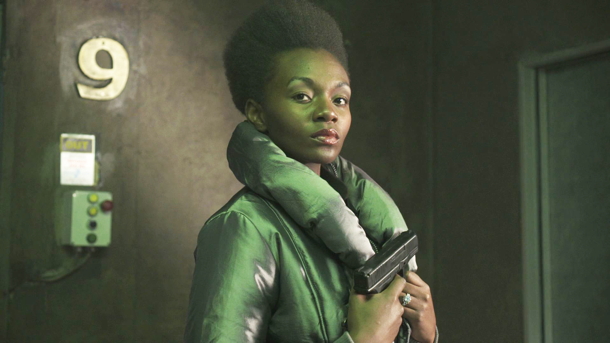EXCLUSIVE Room 9 Interviews
We speak to the brains behind the new paranormal detective series from South Africa
Exclusive interviews with the creative minds behind the South African X-Files, Room 9 .

What were the origins of Room 9 ?
Athos Kyrus, head writer: Darrell Roodt, who's a filmmaker, had come up with this concept with Ivan Milborrow and Michael Swan, which was lifted from a real story, about this detective from apartheid days who worked in an occult unit that dealt with anything that was supernatural in nature. So kind of like The X-Files but in a South African context. They came up with the idea to set the occult unit within the police department set in the future of South Africa, like 2020, and that was kind of the lifting off point.
Is there much genre stuff in South Africa, or Room 9 unusual?
Kyrus: Room 9 is quite revolutionary in terms of trying to do something that was leaning towards science fiction because there really isn’t anything else out there, certainly in terms of television. I think there was as series some time ago that was made in South Africa by a Canadian company, Charlie Jade , and that was the closest. Really South African television is all about soap opera, daily drama and weekly drama, and beyond that there really isn’t anything that’s trying any other genre. So it was quite exciting because it did feel like it was the first time we had ever attempted something like this.
The show deals with creatures from African mythology like the Tokoloshe, that UK viewers may be unfamiliar with. Was it important to bring elements of African legends into the show?
Jeremy Nathan, producer: Absolutely, what was exciting to everyone involved was that these mythical fantasy legends are so prevalent in everyday society across the continent, and they’ve never really been used in TV and film in Africa, though there are a couple of Nigerian films which have very successfully used the horror genre and the success of District 9 , I think, opened up a lot of people’s imaginations.
Sign up to the SFX Newsletter
Get sneak previews, exclusive competitions and details of special events each month!
Room 9 got a fantastic response from the public in South Africa. An average of three million people a week watched the show and they were incredibly active in social media in the lead up to the show, during the show and after the show, to the extent that they are still Twittering now four months after the show has been screened. Some of the responses were like, "t last there’s been a show that enables people just to get pure entertainment whilst dealing with some quite serious legends and themes that are very common in the pulp press."
In the tabloid press here it’s very, very prevalent to have stories of deaths and myths, abducting people, ghosts, African monsters, so we tried to make Room 9 quite pulpy and quite accessible. We are the only country in the world that had [an occult unit within our police] because there are so many of these crimes being committed. There was a story several years ago about a torso that was found in the Thames called Adam and our police unit was called in to assist with Scotland Yard. This is the type of story that inspired everybody.
Kyrus: We tried as much as possible to try and deal with the mythological notion of creatures in South Africa. Certainly the Tokoloshe is one of the most widely prominent. It’s talked about in newspapers every day. We did a lot of research into each individual myth. A lot of these stories were lifted from newspaper articles, from old case files that we found, from the occult unit that was operating in the ’80s.
Click the button below for more!


What was the thinking behind setting the show in New Azania, a fictional place in the future?
Darrell Roodt, director: Part of me would have loved to have set it in a real city, but if it was contemporary and about society today, we wouldn’t have been able to turn in any direction without stepping on someone’s toes and then just getting mired in controversy and bogged down in it. But by setting it in the near, alternative future we were able to just make it.
Kyrus: I think Darrell, when he came up with the idea, always had this notion that it was set in the future but it wasn’t a future that had evolved in terms of technology. It almost had de-evolved in a strange way. So technology in the future was almost retro-futuristic, sort of old school ’80s retro, and I think certainly in terms of the wardrobe you get that sense that this is a country that still feels quite close to the reality we live in today, but there is a sense that it has regressed over 10 years.
Nathan: Johannesburg [where the show is filmed] is an incredibly science fictiony world. It’s very cyber-punk, if I can use that word. It’s incredibly strange and normal at the same time. It’s got a lot of strangeness to it but you don’t have to change the art design that much, the production design. We tried to create a mythical Johannesburg, one that’s both decayed and suffering from toxic, nuclear fallout as it were. And because we didn’t have huge budget we were forced to do it with a lot of limitations. In fact, one of the shows that did inspire us was Max Headroom , a British show that we just loved. It’s an old show but it was done on the smell of an oil rag, very cheaply, and it was definitely an inspiration to us.
Roodt: If you come to a town like Johannesburg is a real megalopolis of various cultures all in one place and time. And also a lot of inner city Johannesburg is in a state of decay. The government are trying to turn that around and local government as well, trying to uplift it and give it a face-lift. But if you walk around the streets of Johannesburg now downtown... Wow, it’s a place of a million movies.
There’s a lot of switching between languages and subtitles. Is that common in South African television?
Kyrus: It is, yes, and in a way it was also a requirement of the broadcaster. In South Africa there’s 11 official languages so you have to cater to that. It is still mostly English, I would say, but there is a lot of Zulu and a smattering of other languages. So Alice [the lead character] and her husband would speak their own language rather than English. It’s slightly more complicated than making a show in Britain where you can write the whole thing in English. The way that we work – the script is written in English, and when we had cast the actors they would literally translate into another language that was specified in the script, so they would workshop it themselves and translate it themselves.
How did you go about creating creatures for the show?
Roodt: Unfortunately the series doesn’t rise to another height because of the fact that we didn’t have a bigger budget for effects. So everything that had a creature we did off screen or by using a dog as a werewolf, something like that. It’s very hard to bring it to life in a way that audiences demand these days because they’re so sophisticated now. They’ve seen every horror trick in the book and every transformation of a creature possible. So whenever you do cheat them of that, it unsettles an audience. However, having said that it has been astonishing experience for me. For example, I still make lots of movies and wherever I go, particularly when I’m in an inner city environment scouting for locations, Room 9 is the one thing they all talk about. They love the show. Because the first time they had seen the occult or something to do with their belief system being explored on the small screen, and I thought that was fascinating. In other words, it's not just another kitchen sink drama, it was something different.
Nathan: We didn’t have a budget to CGI them at all. So we were forced to come up with other ways of creating a mood and an atmosphere that was set in a dysfunctional, post-nuclear, post-toxic world and I think it was something that really freed everyone’s imaginations up. So many stories in South Africa deal with the harsh reality of the world, of corruption, of whatever, of politics, and this was a way for people to get really inspired and to look politically at the world. That’s why a lot of the people involved were inspired by District 9 that deals with the political reality in a future world. Part of Johannesburg’s charm is that it is so completely real and normal, but if you look at it with a slightly different eye, it’s a weird, weird futuristic city. You’re living both in the present but also in the future. It’s a really strange place.
Do you see Room 9 playing out as a story over many series?
Roodt: Well we’ve definitely seen a way forward. What the producers are trying to do now is get a bigger budget to do a season two where we can really get into it. The action has very studio-bound and we had to shoot so many scenes in a cold environment as opposed to going to the streets, so I wish more of the show had been on the streets. I wish it could have been more Blade Runner y but it just costs lots of money to do that.
Kyrus: The way we designed it and certainly the way it ends, it's very open ended. There’s a lot of loose ends at the end that are not really dealt with and that was done intentionally with the hope we would get a second season. We wanted it to be scaleable so we could do a second season and a third season and a fourth season. We had a great response when it was broadcast in South Africa. It was not quite what people were expecting but they completely got into it. So we’re quite optimistic that a UK audience will be entertained by it and also want a second season.
Room 9 debuts on The Africa Channel on Monday 8 July at 9pm.

Richard is a freelancer journalist and editor, and was once a physicist. Rich is the former editor of SFX Magazine, but has since gone freelance, writing for websites and publications including GamesRadar+, SFX, Total Film, and more. He also co-hosts the podcast, Robby the Robot's Waiting, which is focused on sci-fi and fantasy.


